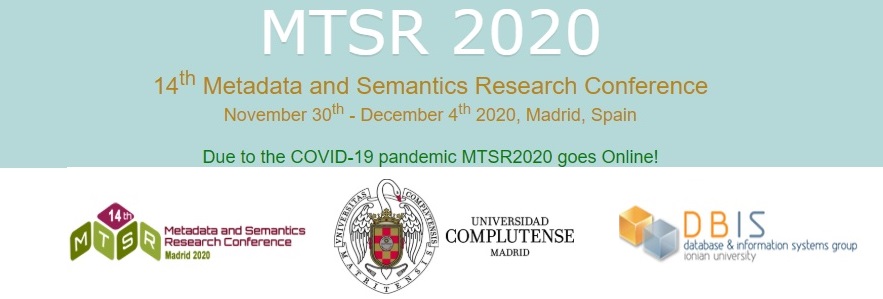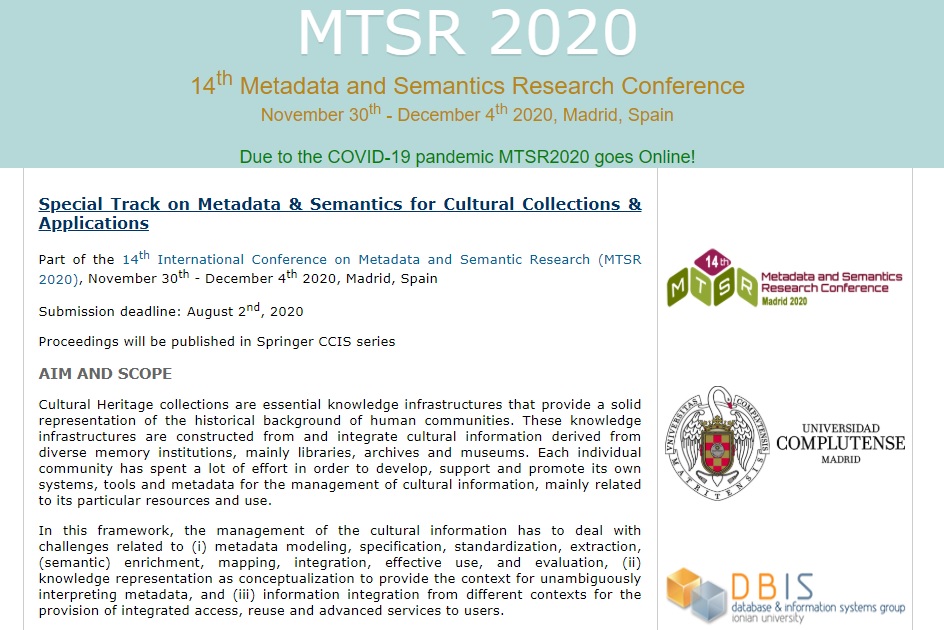|
Digital meets Culture https://www.digitalmeetsculture.net/article/mtsr-2020-14th-metadata-and-semantics-research-conference/ Export date: Wed Feb 18 19:50:25 2026 / +0000 GMT |
MTSR 2020, 14th Metadata and Semantics Research Conference The 14th International Conference on Metadata and Semantics Research (MTSR 2020), as well as the SPECIAL TRACK on METADATA & SEMANTICS for CULTURAL COLLECTIONS & APPLICATIONS, due to the COVID-19 pandemic will take place virtually on 30th November - 4th December 2020. MTSR is an annual international inter-disciplinary conference, which brings together academics, researchers and practitioners in the specialized fields of metadata, ontologies and semantics research. The conference provides an opportunity for participants to share knowledge and novel approaches in the implementation of semantic technologies across diverse types of information environments and applications. *** Submission deadline: August 2nd, 2020 *** Proceedings will be published in Springer CCIS series. CCIS is abstracted/indexed in Scopus, SCImago, EI-Compendex, Mathematical Reviews, DBLP, Google Scholar. CCIS volumes are also submitted for the inclusion in ISI Proceedings. Website:  AIM AND SCOPE Cultural Heritage collections are essential knowledge infrastructures that provide a solid representation of the historical background of human communities. These knowledge infrastructures are constructed from and integrate cultural information derived from diverse memory institutions, mainly libraries, archives and museums. Each individual community has spent a lot of effort in order to develop, support and promote its own systems, tools and metadata for the management of cultural information, mainly related to its particular resources and use. In this framework, the management of the cultural information has to deal with challenges related to (i) metadata modeling, specification, standardization, extraction, (semantic) enrichment, mapping, integration, effective use, and evaluation, (ii) knowledge representation as conceptualization to provide the context for unambiguously interpreting metadata, and (iii) information integration from different contexts for the provision of integrated access, reuse and advanced services to users. At the same time, there are also inter-domain efforts targeted to semantically align data (research data, educational data, public sector information etc.) to cultural information. New challenges are also emerged from the need to incorporate cultural information into the new publication paradigms, where a variety of resources (data, metadata, processes, results, etc) are linked and integrated, providing better shareability and reusability. Currently, Linked (Open) Data, as part of the Semantic Web Technology, is having a major role in modernizing cultural heritage collections. Providing to users the possibility to re-use and integrate data into their own systems is currently more than a need, given that transparency and access to information is a prerequisite. A critical factor to the effectiveness of many aspects of all the above efforts is the quality of metadata, as interpreted by its context and use and evaluated by the proper measures and methods. Many institutions and aggregate infrastructures are dealing with the poor quality of metadata that inevitably results in poor integration, search and reuse, while their enrichment, in terms of contextualization, co-referencing, alignment, etc, is really challenging. The aim of this Special Track is to maintain a dialogue where researchers and practitioners working on all the aspects of the cultural information will come together and exchange ideas about open issues at all stages of the cultural heritage information life cycle. The track also welcomes works related to semantics and applications for new approaches to cultural information publication and sharing, as well as to interlinking to other datasets published in the Semantic Web universe. TOPICS The papers in this special track should be original and of high quality, addressing issues in areas such as: * Cultural Heritage metadata models, standards, ontologies, knowledge organization and representation systems * Cultural Heritage information integration, interoperability and mappings * Automated extraction of metadata, entities, and patterns from Cultural Heritage resources * Metadata manual or automated (Semantic) enrichment and search * Metadata quality metrics, tools and services * Linked Open Data approaches in the Cultural Heritage domain * Publication, linking and citation of Cultural Heritage information and resources * Large volume content management * 3D models-indexing, storage and retrieval approaches * Infrastructures for sharing content * Digital Curation workflows and models * Provenance and preservation metadata for Cultural Heritage digital resources IMPORTANT DATES August 2nd, 2020: Submission deadline September 6th, 2020: Notification of decision (Acceptance/Rejection) September 20th, 2020: Camera-ready papers due November 30th - December 4th 2020: the Virtual MTSR 2020 Conference will take place SPECIAL TRACK CHAIRS * Michalis Sfakakis, Dept. Archives, Library Science and Museology, Ionian University, Corfu, Greece (sfakakis@ionio.gr) * Lina Bountouri, Dept. Archives, Library Science and Museology, Ionian University, Corfu, Greece and EU Publications Office - European Commission, Luxembourg (boudouri@ionio.gr, linabountouri@gmail.com) PROGRAM COMMITTEE - Trond Aalberg, Oslo Metropolitan University, Norway - Enrico Francesconi, EU Publications Office, Luxembourg, and Consiglio Nazionale delle Ricerche, Firenze, Italy - Manolis Gergatsoulis, Ionian University, Greece - Antoine Isaac, Vrije Universiteit Amsterdam, Netherlands - Sarantos Kapidakis, University of West Attica, Greece - Christos Papatheodorou, National and Kapodistrian University of Athens and Digital Curation Unit, IMIS, Athena RC, Greece - Chrisa Tsinaraki, Joint Research Centre, European Commission, Italy - Andreas Vlachidis, Faculty of Computing, Engineering and Science, University of South Wales, UK - Maja Žumer, University of Ljubljana, Slovenia |